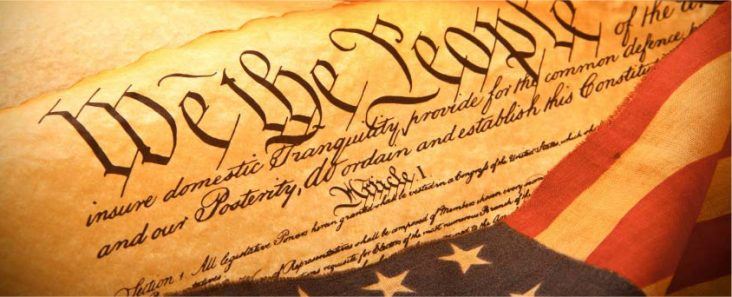House makes it tougher on third parties, approves constitutional convention
by February 13, 2019 6:06 pm 1,114 views

A bill making it harder for third parties to appear on Arkansas’ ballot is headed to the governor’s desk, while the state is now a procedural vote away from becoming the 13th to call for an Article V constitutional convention to pursue amendments limiting the federal government’s powers.
Senate Bill 163 by Sen. Trent Garner, R-El Dorado, would require third parties to collect a number of signatures equal to 3% of the voters in the previous gubernatorial election.
Under current law, any party that does not win 3% of the vote in the previous presidential or gubernatorial election must collect 10,000 signatures. The bill would increase that number to almost 26,750 signatures in 2020.
The bill passed the House Tuesday, Feb. 13, 60-20 with five voting present and 15 not voting. The bill’s emergency clause then passed, 70-16, with 1 voting present and 12 not voting. The bill passed the Senate Jan. 29.
Gov. Asa Hutchinson sent a statement saying, “I haven’t had a chance to review this bill in its entirety yet. However, with a growing population, it’s fair to have a debate over whether a percent requirement is more appropriate than a static requirement. I look forward to discussing this issue with Sen. Garner further.”
No one other than the House sponsor, Rep. Jeff Wardlaw, R-Hermitage, spoke for or against the bill.
The Libertarian Party of Arkansas’ gubernatorial candidate in 2018, Mark West, won 2.9% of the vote, falling just short of 3%.
LPA Chairman Dr. Michael Pakko said in a text, “I’m disappointed, of course. If the governor signs this into law, it would make it difficult if not impossible for third parties to place their candidates on the ballot. It is unjustified on any reasonable policy grounds, and its constitutional grounds are tenuous at best.”
Asked if the party would sue the state, Pakko said, “It’s difficult to see any other way forward.”
Meanwhile, the House passed Senate Joint Resolution 3 by Sen. Gary Stubblefield, R-Branch, calling for a constitutional convention. It passed 54-38, with eight not voting.
The measure now returns to the Senate to add an amendment adding the names of 26 House sponsors. It passed the Senate 19-13 with 2 not voting on Jan. 29.
The resolution would call for a constitutional convention under Article V of the United States Constitution. Delegates would consider amendments imposing fiscal restraints on the federal government, limiting the federal government’s power, and enacting term limits for federal officials and members of Congress.
This method of amending the Constitution is included in Article V of that document but has never been used in American history. It would require resolutions passed by 34 states. Any proposed amendments that came out of the convention would have to be approved by 38 states.
Mark Meckler, national Convention of States Action president, who was at the Capitol, said afterwards that 12 states have passed the resolution. He said Mississippi and Utah appear to be good prospects and that the movement this year has a good chance of adding up to 10 states.
The resolution had failed to pass in recent legislative sessions. Meckler credited a grassroots effort of almost 18,000 people in the state. Lawmakers were given lists of supportive constituents. Bud Cornwell of Fayetteville, the state Convention of States director, said activists have been educating legislators about the Article V process.
The lead House sponsor, Rep. Austin McCollum, R-Bentonville, told legislators that the federal government is $22 trillion in debt, an issue that is more personal for him because he is the House’s youngest member. He said the issue is not just the debt but also federal overreach and the “federal takeover of the decision-making process.”
He said an Article V convention is the “exact remedy that the Founding Fathers envisioned for times like ours.”
He told lawmakers, “I would tell you that most of the problems our country is facing is the result of constitutional interpretations that capitalize on ambiguities,” such as the general welfare clause. He said the process contains checks and balances to prevent a runaway convention, including the requirement that 38 states must ratify any proposal.
Freshman Rep. Cindy Crawford, R-Fort Smith, spoke against the resolution in her first speech in the well, saying that the constitutional remedy for states to oppose the federal government is to refuse to comply with the federal government or actively seek to block it.
Rep. Brandt Smith, R-Jonesboro, said he supports the resolution because opponents have no plan to address the nation’s problems.
“My question to you is, if not now, when? We can either manage the decline of our nation, or we can step up and try to guide our nation back to some common sense approach to government,” he said.
Rep. Stephen Meeks, R-Greenbrier, who voted yes, said it was a question of faith versus fear, and that legislators should have faith that their fellow Americans would block any unacceptable amendment.
But Rep. Dan Douglas, R-Bentonville, did not have as much faith.
“This is the Constitution of the United States of America, our founding principles we’re talking about here. … We are so divided, it’s scary to me what we might come up with,” he said.
Rep. Jack Ladyman, R-Jonesboro, said the resolution is a risk, but one that is managed with safeties in place.
The House also passed Senate Bill 71 by Sen. Bill Sample, R-Hot Springs, which requires that each congressional district be represented on the Highway Commission.
